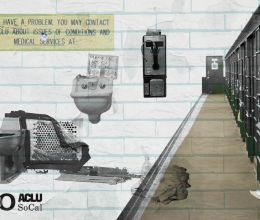Orange County Jails
Conditions that fail to meet not only constitutional but also state and department standards for physical security, medical care, mental health care and living environment are unlawful and should not be tolerated. Discriminatory policies and practices and noncompliance with legal standards may further violate the rights of individuals who are incarcerated and give rise to concerns of legal liability.
For more than 40 years, the American Civil Liberties Union Foundation of Southern California (ACLU SoCal) has worked to ensure that a basic standard of care is provided to people in jail. The ACLU SoCal is the court-ordered monitor of conditions of con nement within all Los Angeles County jail facilities.
Through its Jails Project, the ACLU SoCal responds to complaints by individuals who are incarcerated and ensures that court-ordered reforms are implemented. In August 2015, the ACLU SoCal began to examine the conditions inside the Orange County jail system to determine whether a basic standard of care is provided to all individuals in custody. The inquiry was prompted by media and incarcerated individuals’ accounts of abuse and misconduct. Before the study began, the ACLU SoCal routinely received complaints and requests for assistance at its Los Angeles and Orange County offices from people incarcerated in Orange County jails.
Orange County Jails, a report by the ACLU SoCal Jails Project, includes findings from interviews and surveys of current and formerly incarcerated individuals. Accounts on a range of issues are incorporated and analyzed against constitutional standards as well as policies and procedures of the OCSD and Title 15 Regulations of the Board of State and Community Corrections (BSCC). A discussion of major findings is followed by recommendations. The report also covers OCSD structure and operations, in-custody related deaths, a federal program to house undocumented immigrants, an informant scandal, a 2016 jail escape, lawsuits, and oversight. The report aims to raise awareness and increase transparency and accountability in an effort to halt violations.
Related content
ACLU SoCal Statement on OC Sheriff Sandra Hutchens’s Retirement
June 27, 2017ACLU Report Finds Inhuman, Violent Conditions in Orange County Jails
June 27, 2017
Overcrowded and inhumane: How a 1975 lawsuit on horrific jail...
December 21, 2023Cold, Rotting & Moldy Meals
December 14, 2021ACLU Sues O.C. Sheriff Over Jail Conditions During Pandemic
April 30, 2020Ahlman v. Barnes
April 30, 2020
